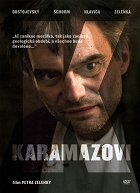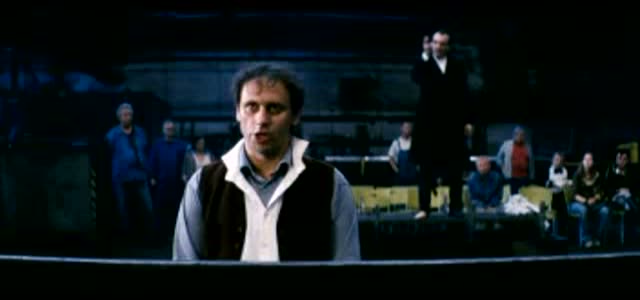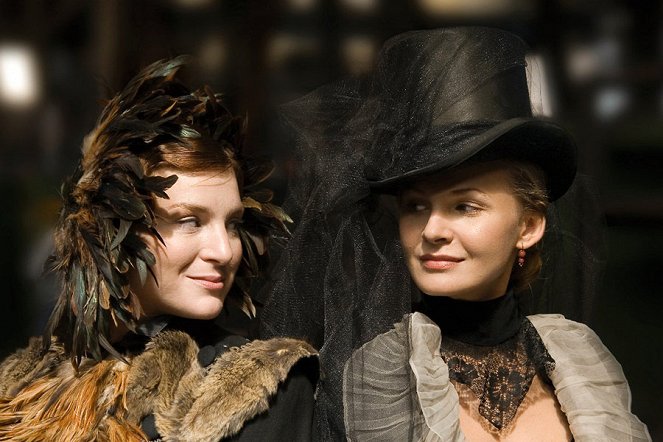Director:
Petr ZelenkaCámara:
Alexander ŠurkalaMúsica:
Jan A.P. KaczmarekReparto:
Ivan Trojan, Igor Chmela, Martin Myšička, David Novotný, Radek Holub, Lenka Krobotová, Michaela Badinková, Lucie Žáčková, Marek Matějka, Jan Kolařík (más)Sinopsis(1)
The story of Petr Zelenka’s movie The Karamazovs takes place in contemporary Poland. A group of actors from Prague, led by a play director, arrive in Krakow to present a theatrical adaptation of Dostoyevski’s novel The Brothers Karamazov at an alternative festival organized in the unconventional environment of a steel mill. The theatrical play, the plot of which evolves around a patricide investigation, tells the story of debaucher and cynic Fyodor Karamazov and his four sons. The issues of faith, immortality, and the redemption of man present themselves as the powerful emotions of love, jealousy, and hatred play out on the makeshift stage of the dilapidated mill. Simultaneous with the rehearsal we observe story lines from the real world, of the cast, and of those who still work in this steel mill. Sometimes the effect is comic, but tragedy waits in the wings. A factory maintenance man learns during the rehearsal that his son, who is in the hospital due to an accident at the mill, has died. The rehearsal continues at the man's request. Suddenly the biggest drama does not take place on stage but in the audience… (texto oficial de la distribuidora)
(más)Videos (3)
Reseñas (8)
No he leído la obra de Dostoievski, lo cual seguramente puede ser un handicap, sin embargo, no me perdí en la trama y me orienté en los diferentes personajes principales. Cuando actúa Ivan Trojan, tengo escalofríos y el ataque epiléptico de Radek Holuba me impactó de igual manera. Sin duda, la mayor experiencia cinematográfica checa del año 2008 para mí.
()
Zelenka has imprinted a very specific visage on a strong fabric that would tighten "on its own," which straddles the line between pure art and something "other," which is what so many people call for from Czech cinema. I give Zelenka a standing ovation for the way the film managed to get away from theatricality by not letting itself be carried by the (otherwise without exception top-notch) actors, by giving it a distinctive cinematic shape through editing, cinematography, and especially the music. One of the best Czech films in a long time. Bravo!
()
In the non-violent line of actors, both the plot and the characters interested me, but since the ensemble delves into their roles and only occasionally pops up to discuss the unfortunate janitor or the unsympathetic director in a few sentences, everything is wrong. What's the point of delving into Russian classics when it's just superficial? Zelenka wanted to shoot an experiment with his friends, but I would rather avoid it. The final scene, which is only present so that the film has some ending, may anger me. The second star is more or less just for the embarrassment of not giving credit to the acting performances beyond the limits of what is possible.
()
I could paraphrase my review on Country Teacher and write something like this: “Now try telling me that European cinema is dead." But I won’t waste time repeating that and so absolutely uncritically (and anything goes, according to Dostoyevsky) I write that, together with Tornatore’s The Unknown Woman, The Brothers Karamazov is the best movie to come out of the continent of Europe this millennium. As a result, this may well seem to many viewers just like a two-hour commercial for Dejvice Theatre (which is an accusation hard to argue with), but unlike the commercial for the Kalich Theatre (that’s right, Kvaska), this is a demonstration to the world of how skillful and talented Prague’s best theatre is right now. And it’s that simple. Believe if or not, or you can try not agreeing. Long live Dejvice! And many more movies from them!
()
A film that Czech cinema needed in the same way a hangman needs a rope. Peculiar, infused with the author's strong vision and with content that is existentially disturbing, dense and well-structured. Zelenka does not detract from his somewhat strange mystifying "humor", but despite a few sketches, the Karamazovs' focus lies in the brilliant blending of Dostoevsky's classic and the human drama of the "real" world. Putting rich dialogues into the rusty and dirty world of steel mills is a wonderful idea, and the contrast between tradition and industry is surprisingly not disruptive, but in fact meaningful. The entire film becomes a theater and the theater depicts the entire world. The reflection and interweaving of "mimesis" and "reality" is captivating. Incredible acting. Zelenka was able to enliven the big theater with film speech, a great camera and perfect musical accompaniment. This created a film on a level that has not been made in the Czech Republic for years (if ever).
()



Anuncio